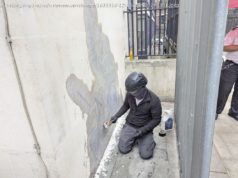The hyperventilation in Washington is unjustified.
The decision of President Donald Trump to fire FBI Director James Comey is generating a fevered, near-maniacal response that is out of proportion to the asserted wrong. There is certainly, much of it related to the animosity that Trump is said to bear toward Comey, which proves once again that on all matters of state, this president is often his own worst enemy. (I have criticized him in no uncertain terms both and the election.) There is of course much to regret in the timing of the decision, and good reason to think it’s a political miscalculation in light of the ferocious response that it has generated. But political blunders are one thing, and a constitutional crisis is another. Yet in Washington’s fevered environment, Trump’s many critics take evident delight in trying to outdo each other in their denunciations of the president. Thus Vox’s Matthew Yglesias that although the time for impeachment has not yet arrived, Trump’s decision to fire Comey carries with it (as a headline put it) “a whiff of obstruction of justice, ” which is an impeachable offense if proved. Writing in the New Yorker, argues that Comey’s decision, while not (yet?) an impeachable offense, is “far more problematic and dangerous than the one facing the nation forty-four years ago.” At that time, President Richard Nixon ordered the firing of special prosecutor Archibald Cox, which prompted the resignation of both Elliot Richardson, the attorney general, and William Ruckelshaus, his deputy. Robert Bork was left to discharge that unhappy task, for which he paid a heavy political price 14 years later when he was denied a seat on the Supreme Court. Not to be outdone, New Yorker columnist treated the firing as “a terrifying attack on the American system of government, ” carried out by a man who “acted like a despot” who now has the opportunity to pick his own FBI head, who “will have the authority to close down the investigation.” At the same time, , led by Senate Minority Leader Charles Schumer, have insisted in unison on the appointment of a special prosecutor to take over the investigation, even before a permanent FBI director is in place. There are of course many reasons why one might oppose Trump’s decision to fire Comey, but none of them remotely deserve the hyperbolic responses that Comey’s termination has elicited. There are two sides to every story, and in this case the other side has, at least for the moment, the better of the argument. The first point to note is that Comey deserved to be fired, long ago, for the offenses that were set out in the of May 9,2017 (subject line: “Restoring Public Confidence in the FBI”) , that Rod Rosenstein prepared, which outlined Comey’s breaches of his duties as FBI head. Rosenstein, the newly appointed deputy attorney general, cogently described several significant errors of judgment, mainly having to do with Comey’s public statements about his investigation into Hillary Clinton’s use of a private email server while secretary of state. But, if anything, he understated the case against Comey. First, Comey treated the initial investigation of Hillary Clinton back in March 2015 with. There were first the inexcusable decisions to grant immunities to key Clinton backers without first serving them with a subpoena that would have allowed the FBI to extract a quid pro quo for any immunity that thereafter might be granted. Second, the FBI allowed Clinton’s key aide Cheryl Mills, Clinton’s former chief of staff, to act as her legal counsel, even though she herself was a legitimate target of investigation who could have faced charges. And they did not conduct any of the ambush interviews that are commonly given in cases where criminal prosecution is warranted. The obvious inference is that Comey was kowtowing to his superiors in the Obama White House. Next, of course, was his public on July 5,2016, in which he gave a thoroughly unsatisfactory explanation as to why he chose not to prosecute Clinton for her use of an unauthorized server that, in a case involving lesser persons, would have resulted in serious criminal charges, wholly without regard as to whether unauthorized persons hacked into the site (which they surely did) . Once Attorney General Loretta Lynch, as Judge Laurence Silberman, “sort of half-recused herself” from the case, any charging decision should have been made by or at the direction of Sally Yates, the deputy attorney general. As Rosenstein rightly said in his memo, no experienced law enforcement figure thought that Comey acted correctly in issuing a public statement that explained his point of view. Finally, his late October surprise, rightly castigated by none other than the New Yorker’s, that he was conducting another investigation of Clinton, one that went nowhere, was likewise a breach of his duties. The common response to this line of attack is that criticisms of Comey’s conduct in the Clinton investigation had nothing to do with the president’s decision, which was made, we are confidently told (on the basis of no firm evidence) , because Comey was hot on the trail of information about possible ties between Trump, his supporters, and the Russians during the campaign. But it is also the case that Comey has made no effort to distance himself from this earlier conduct, and indeed affirmed in his of May 3,2017, that with respect to his October 28 letter on Clinton, even though the episode had made him “mildly nauseous, ” he would do it all over again. The past events thus are linked closely to the future events. If the mistakes Comey made could have justified his firing in either 2015 or 2016, the passage of time does not cure those improper decisions. It requires contortions to convert an action that has independent justification into one that prompts talk of obstruction of justice and impeachment. In effect, one difficulty with that extravagant assertion is that it makes Comey de facto immovable from office so long as he continues to conduct this investigation. That cannot be the proper analysis because Comey has many other administrative responsibilities, including maintaining morale inside the office. No one should be able to guarantee his term in office by conducting a nonstop investigation of the president. In this case, moreover, there has been to date no credible evidence of the improper linkage between team Trump and the Russians. This situation is, to say the least, a far cry from the situation with the in October 1973 when Cox had properly requested access to the tapes in the president’s possession — tapes that included evidence of Nixon’s deep involvement with the Watergate burglary. Now, counts as obstruction of justice. In the present case, nothing come close to that unless and until it is established that Trump is in possession of tapes or documents that show a similar level of involvement. Nor is there anything to the claim that Trump has acted as a despot. Despots remove people in order to take over all the organs of government themselves. Cassidy seems to think the president has it within his power to appoint a successor to Comey entirely on his own, when the position requires confirmation by the Senate. I am confident that Trump would never nominate, and the Senate would never confirm, New Jersey Gov. Chris Christie, who was one possibility floated by CNN analyst Jeffrey Toobin against Trump. Nor is there any reason to think firing Comey will stop the investigation in its tracks.
Home
United States
USA — Art Attention, liberals: Comey deserved to be fired, and the Constitution is just...






